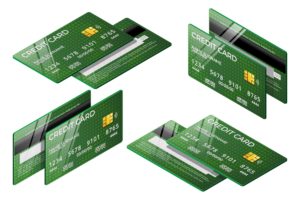Your Money, Your Safety: Fortifying Online Banking Security

Banks scammers isometric composition with small human characters and icons of laptop gadgets money and wallet vector illustration
In this digitally evolved world, online banking has revolutionized how we complete transactions from our mobile through online banking apps.
You can manage multiple bank accounts through the credit unions or bank’s application or website.
You can complete multiple transactions through online applications and websites like:
- Deposit Checks
- Send money to anyone you desire.
- Monitor your balances to avoid attracting any fees.
These online banking applications and websites can save valuable time, and you can do all your bank or credit-related services through this app and website without visiting the bank or credit union.
Safety Measures Adopted By Your Financial Institution And Credit Unions


Credits: Pixabay
Online banking gives us the convenience of managing multiple accounts and performing different bank-related services through our mobile.
However, a recent study found that most people felt safety concerns regarding mobile app security.
- You do not have to compromise your convenience for security.
- The bank’s safety measures, plus the safety precautions that you take, will secure your online banking process.
A bank’s security measures, plus your efforts in taking precautions will maximize your security, and you will be less prone to online banking fraud.
- Financial institutions and credit unions employ policies that protect the integrity and secure the account of their customers.
Some safety measures that credit unions and banks provide for securing the bank accounts of their customers are:
- Bank computers have anti-virus protection to prevent data breaches.
- Bank computers have firewalls installed to prevent data breaches.
- Fraud monitoring.
- Website encryption helps data to reach the only intended recipient.
Your credit union and financial institutions offer these security measures to prevent your data from breaching and any scams or frauds.
However, there are some precautions and security measures that you must take by yourself to prevent any data breaches and security issues:
1. Choose The Right Financial Institution Having Strong Security


Credits: Pixabay
Whenever you choose a bank, you eye for getting the lowest fees with the highest interest rate.
- These are the main imperative factors, but you must incorporate top-notch security also.
The other factors that must be incorporated into the security policies of your financial institutions are:
- Anti-Virus protection
- Firewalls
- Fraud monitoring
- Website Encryption
If you cannot find the security measures outlined in the bank’s fine print or website, you can directly contact your financial institution for the same.
2. Multifactor Authentication


Credits: freepik
One of the simplest steps that can be to build a protection wall for your safe online banking is activating the multifactor authentication.
- Multifactor Authentication is the additional layer of security when a person logs in to their account.
- Aside from the username and password, the person must answer another security question, factor, or piece of information requested by the financial institution.
- This question or piece of information can be anything like OTP, your birth date, your pet’s name, or anything that you have set.
This multifactor authentication increases your security as your password might be easy to crack, but the additional piece of information required to access your account is hard.
Almost all financial institutions have these standards set to provide maximum security.
3. Avoid Public Wi-Fi While Using Online Banking


Credits: Pixabay
One of the mistakes that people make sometimes while using online banking is using public Wi-Fi while completing transactions.
- Cyberattacks have been common in this digitally evolving world.
- A simple mistake can be the gravest mistake if you are not alert enough.
- When you are connected to a public Wi-Fi, you never know what content you go through is saved by the owner of that connection, unless you land on an encrypted page.
If you have to complete a transaction or have some other work and are outside your home network, you must use your cellular data to do the same.
- The website you are visiting must contain HTTPS (s) because it stands for security.
4. Have Complex Passwords For Maximum Security


Credits: freepik
It is an unsaid rule, and everybody understands the importance of having complex passwords for any account.
- Any government website requires you to have at least 12-16 characters.
- Having a lengthy password which contains digits, special characters, and a mix of uppercase and lowercase characters makes your password unique and hard to hack.
Even if a person applies brute force to hack your password, it is nearly impossible if you have incorporated all the above factors in your password.
5. Text Alerts


Credits: freepik
Several financial institutions provide text alerts if you have made a large purchase from your account.
- These text alerts are also received by the person if their account balance falls under a certain amount.
These SMS or text messages alert you if any other purchase is made through your account. You can contact your financial institution if any such problem arises.
You can connect with your financial institution up to 60 days from the date of the bank statements dispute.
Conclusion
People have different opinions on whether online banking is safe or not, but we cannot lead our daily lives without using online banking. These tips can strengthen your social security.



